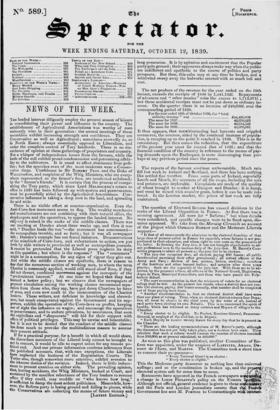NEWS OF THE WEEK.
Tee landed interest diligently employ the present season of leisure in consolidating their power and influence in the country. The establishment of Agricultural Associations was worthy of men eminently wise in their generation : the annual meetings of these assemblies exhibit increasing strength and confidence. They are
Conservative as well as Agricultural; sometimes avowedly so, as in North Essex; always essentially opposed to Liberalism, and under the complete control of Tory landlords. There is no dis- cordance of opinion at these gatherings of proprietors and tenantry. Not a whisper of independence issues from the farmers, while the lords of the soil exhibit proud condescension and patronizing affabi- lity to the cultivators. It is usual to affect abstinence from poli- tics; but the speeches even of the most moderate wear a Conser- vative tinge. Confidence in Sir RonEar PEEL and the Duke of WELLINGTON, and suspicion of the Whig Ministers, who are every- where represented as the farmer's foes, arc inculcated sedulously 11: the " farmer's friends." It is certain that the process of reorga- cuing the Tory party, which since Lord MELBOURNE'S return to office in 1835 has been followed up with system and perseverance, must be powerfully aided by the Agricultural Associations. Con- servative influence is taking a deep root in the land, and spreading far and wide.
There is no visible effort at counter-organization. Even the Anti-Corn-law movement seems to flag. The wealthy merchants and manuflicturers arc not combining with their natural allies, the shopkeepers and the operatives, to Oppose the landed interest. No rally-cry is raised in the ranks of the middle classes. There was one meeting at Dundee about three weeks ago, and then it was said, " Dundee leads the van "—the movement has commenced—. the monopolists tremble, and so forth ; but it was all newspaper talk ; Dundee's example has not found imitators. Demonstrations of the mischief's of Corn-laws, and exhortations to action, are put forth by able writers in provincial as well as metropolitan journals. It cannot be pretended that the Liberal press neglects its duty on this question ; but where is the response? The "consumers might be in a consumption, for any signs of vigour they give out. And while the middle classes are apathetic, there is reason to fear that the numerous section of working men, to whom the term Chartist is commonly applied, would still stand aloof from, if they did not thwart, combined movement against the monopoly of the "predominant interest." At one time we hoped-tbat they had learned a better policy ; but we observe that the newspapers of greatest circulation among the working classes recommend sepa- ration from those who, they say, have put down Chartism by force of arms, and even now exult in the incarceration of the Chartist leaders. These writers, not deficient in knowledge and shrewd- ness, but much exasperated against the Government and its sup- porters, exhibit the operation of the Corn-laws on profits, keeping out of sight the influence on wages; and encourage the operatives to perseverance, and to endure privations, by assurances, that soon the capitalists and " shopocrats" will bid for their support with offers of political privileges. This may be unwise and lamentable; but it is not to be denied that the conduct of the middle classes has done much to provoke the multitudinous masses to assume their present attitude.
If for a practical purpose, for a benefit in which all would share, the discordant members of the Liberal body cannot be brought to act in concert, it would be idle to expect union for any remote po- litical end. And our private information confirms inferences from the published accounts, that, with rare exceptions, the Liberals have neglected the business of the Registration Courts. The Tortes also, though somewhat more attentive, exhibit aversion to the irksome duties of the revision. Indeed, there is little induce- ment to present exertion on either side. The prevailing opinion, that, barring accidents, the Whig Ministers, backed at Court, and anstamed by the manifest reluctance of the Tory leaders to resume office if they could, may muddle on "who knows how long,"
sufficient to damp the most ardent politicians. Meanwhile, how- ever, the Reform party is losing ground and falling to pieces, while the Conservatives are collecting the means of future victory and [LATEST EDITION.] long possession. It is by agitation and excitement that the Popular party gain ground; their opponents always make way when the public are indifferent and apathetic to the course of politics and party prospects. But then, this calm may at any time be broken, and a whirlwind sweep away the bulwarks erected with so much toil and cost.


























